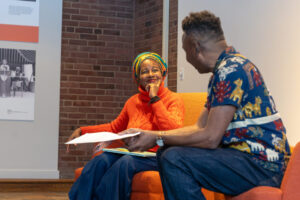Award-winning Clark professor helps city students tell their stories through film
Eric DeMeulenaere guides Worcester high school students in the making of their documentary. What are the stories in people’s lives that are not being told? And what stories are being misrepresented in the media? Eric DeMeulenaere, assistant professor of urban schooling in the Clark University Education Department, posed these questions to a group of Worcester public high school students this past spring and guided them through the process of making a documentary film to find the answers. Known as SPIT-IT, the 15-week project is under the auspices of N-CITE Media Collective, run by DeMeulenaere and colleague Angelique Webster. Clark alumna Thu Nguyen ’14 helped launch the program two years ago and continues to stay connected. DeMeulenaere’s storytelling expertise and Webster’s technical filming and editing skills give the students a full view of documentary filmmaking; they tackle real-life, personal issues and explore themes honestly, and often starkly, through their movie. The project lets the students take the helm, brainstorming ideas, handling production tasks, conducting interviews, and editing the footage into a 30-minute film. The documentary is shown to various audiences, including family and friends who might be hearing these stories for the first time.
Eric DeMeulenaere has received the Lynton Award for his longtime work to improve urban education.Finding the right topics isn’t always easy. The inaugural film explored several issues, like body image, and the sophomore effort examined the immigrant experience. This year’s theme is “colorism” — specifically how different skin tones are perceived and judged within communities of color. It’s a subject rarely discussed openly, DeMeulenaere says. “We help the youth find the stories from their realities that remain hidden from the world,” he says. “They become aware that those stories are what give them the most power.” One student first revealed his undocumented status in last year’s film and is now publicly advocating in-state tuition for undocumented immigrants. How people perceive skin tone and whether it leads to inclusion or exclusion in a group is something the students experience but rarely give voice to, DeMeulenaere notes. Bringing the topic to the screen helps the students address the ways colorism is practiced and the deep pain it can create. The film projects attract a variety of students. Some participants want to become professionals in the film industry; others are simply curious. Few anticipate the intense emotions they may experience or the incredible effort the project requires. For the dozen students creating this year’s documentary, it’s a significant commitment (every Friday after school and extra time for interviews, filming, and editing) that requires dedication if the project is to succeed. DeMeulenaere says the filmmakers are held to a rigorous set of expectations. “We are hardcore,” he insists. “We aren’t playing, and we push them pretty hard.” Worcester Technical High School junior Sinneh Guzeh is a media assistant in the program after participating last year. “I like that we have control over the topics,” Guzeh says. “I feel like this is important for the community because it deals with youth. When you are focusing on youth, you are focusing on the future.” Students go through an application and screening process to determine if they can work in the intense collaborative environment the project requires. The bar is always being raised. “We expect them to do better than the last group,” DeMeulenaere says. “We have high standards.” Guzeh agrees. “At times it’s hard and it can be tedious to get things perfect. The amount of work you put in is a lot, but it’s empowering at the end when you see that work unfold.” Students learn the technical skills that film producers need, so they each assume responsibility for producing one shoot. DeMeulenaere and the students also explore the ways their personal influences affect how the story develops and is portrayed. Recent Claremont Academy graduate St. Cyr Dimarche says working on the 2014 documentary opened his eyes. “After making it, I got to understand a lot about the media,” he says. Now headed to Brandeis University to study international relations, Dimarche says even being grouped with people he didn’t know was a great experience. “We shared our stories with so many people,” he says. “The more I talk to people, the more they understand.” Understanding the tools of media, DeMeulenaere says, includes being able to disrupt the dominant narrative and become a critical consumer of media messages. Students also have to understand the deep responsibility they have in carrying forward their own stories and the stories of others. “After the program, I see the importance of telling your story,” says Guzeh. “You see how it affects other people.” Criticism and feedback aren’t always easy to accept, but the students learn to appreciate it, DeMeulenaere says. “We live in a culture where we celebrate mediocrity,” he says. “[The students] know when you get positive feedback here, it’s not fake.” The process of reflecting on the program helps ground the students. “This program will always be a part of me,” says Guzeh. “It helped me grow and see the importance of me as a youth and of the power of youth in the world. It helped me see the importance of voting, of educating yourself.” Nguyen says the change she saw in the students and in their adult leaders was transforming. “My favorite part about the experience is the human relationships between all of us, and seeing the youth in their power,” she notes. “Nothing can replace that.” For DeMeulenaere, the students’ growth and energy is invigorating as an educator — and life-changing on a personal level. “This is my soul work,” he says. “They work their butts off, and that’s the culture we are trying to build. We are not trying to take the easy path. We are taking the hard path, and it’s something they are proud of.”




